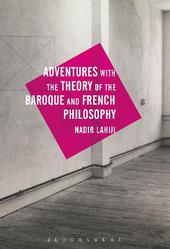
|
Adventures with the Theory of the Baroque and French Philosophy
Hardback
Main Details
| Title |
Adventures with the Theory of the Baroque and French Philosophy
|
| Authors and Contributors |
By (author) Nadir Lahiji
|
| Physical Properties |
| Format:Hardback | | Pages:296 | | Dimensions(mm): Height 234,Width 156 |
|
| Category/Genre | Theory of architecture
Western philosophy from c 1900 to now
Philosophy - aesthetics |
|---|
| ISBN/Barcode |
9781474228541
|
| Classifications | Dewey:720.1 |
|---|
| Audience | | Tertiary Education (US: College) | |
|---|
| Illustrations |
10 b/w illustrations
|
|
Publishing Details |
| Publisher |
Bloomsbury Publishing PLC
|
| Imprint |
Bloomsbury Academic
|
| Publication Date |
22 September 2016 |
| Publication Country |
United Kingdom
|
Description
Analysing the reception of contemporary French philosophy in architecture over the last four decades, Adventures with the Theory of the Baroque and French Philosophy discusses the problematic nature of importing philosophical categories into architecture. Focusing particularly on the philosophical notion of the Baroque in Gilles Deleuze, this study examines traditional interpretations of the concept in contemporary architecture theory, throwing up specific problems such as the aestheticization of building theory and practice. Identifying these and other issues, Nadir Lahiji constructs a concept of the baroque in contrast to the contemporary understanding in architecture discourse. Challenging the contemporary dominance of the Neo-Baroque as a phenomenon related to postmodernism and late capitalism, he establishes the Baroque as a name for the paradoxical unity of 'kitsch' and 'high' art and argues that the digital turn has enhanced the return of the Baroque in contemporary culture and architectural practice that he brands a pseudo-event in the term 'neobaroque'. Lahiji's original critique expands on the misadventure of architecture with French Philosophy and explains why the category of the Baroque, if it is still useful to keep in architecture criticism, must be tied to the notion of Post-Rationalism. Within this latter notion, he draws on the work of Alain Badiou to theorize a new concept of the Baroque as Event. Alongside close readings of Walter Benjamin, Theodor Adorno and Michel Foucault related to the criticism of the Baroque and Modernity and discussions of the work of Frank Gehry, in particular, this study draws on Jacque Lacan's concept of the baroque and presents the first comprehensive treatment of the psychoanalytical theory of the Baroque in the work of Lacan.
Author Biography
Nadir Lahiji is an adjunct Associate Professor of architecture at the University of Canberra, Australia. He is the editor of Can Architecture Be An Emancipatory Project? Dialogues on Architecture and the Left (2016). He previously edited The Missed Encounter of Radical Philosophy with Architecture (Bloomsbury 2014).
ReviewsNadir Lahiji's Adventures with the Theory of the Baroque and French Philosophy provides, as promised, a genuine intellectual adventure. Using an encyclopedic knowledge of recent French philosophy and his impressive background in architecture, Lahiji constructs a breathtakingly new theory of the baroque that completely alters previous understandings of the concept. This is required reading for anyone interested in the baroque or in contemporary French philosophy. -- Todd McGowan, Associate Professor, The University of Vermont, USA With Adventures with the Theory of the Baroque and French Philosophy Nadir Lahiji has produced a first rate and thoroughgoing critical engagement with the enormous and challenging body of theoretical work on the baroque that has emerged primarily from late 20th-century French thought. Building on a careful reconstruction of the core philosophical issues at the heart of the Benjaminian, psychoanalytic, and Deleuzian permutations of the baroque question, Lahiji breaks new ground as he brings the theoretical edifice full circle to its very source in the contemplation of architecture. -- William Egginton, Andrew W. Mellon Professor in the Humanities, The Johns Hopkins University, USA Nadir Lahiji's engagement with the baroque is a most remarkable intellectual achievement. It scrutinizes the baroque in all its multifaceted and contradictory aspects, presenting not merely its historical context and value, but placing it at the heart of contemporary theoretical and political strives. Lahiji examines the very nature of modernity, confronting Lacan's and Deleuze's take on it, rereading Benjamin's classical account and proposing a devastating critique of the 'neobaroque' in modern architecture. Great joy to read and a great challenge for thought. -- Mladen Dolar, Professor of Philosophy, University of Ljubljana, Slovenia
|